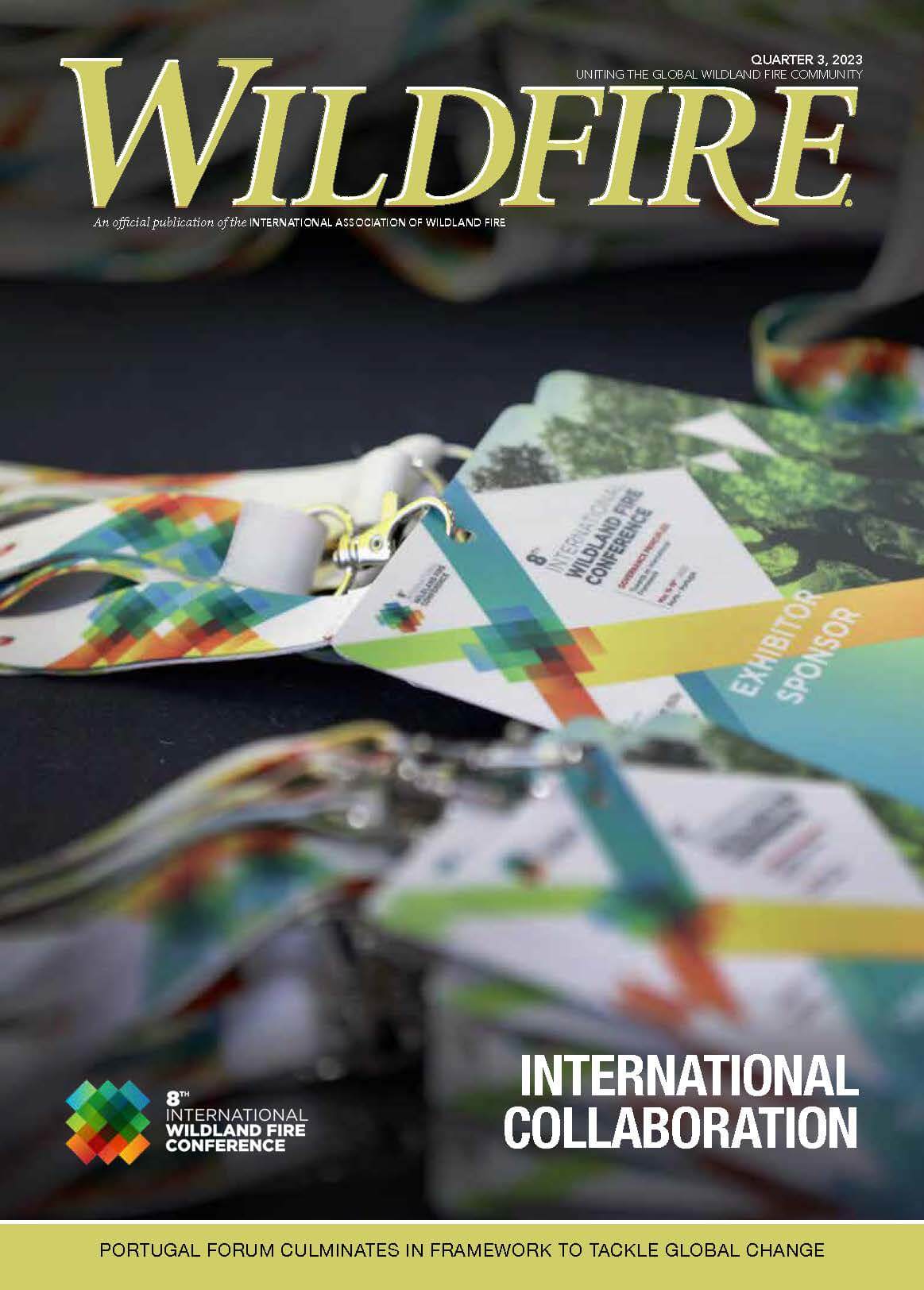COLLABORATION IN EUROPE: FOREST CAMP PROVIDES EXCHANGE OF FIRE-MANAGEMENT KNOWLEDGE
BY CIARAN NUGENT, JAN KACZMOROWSKI AND ALEX HELD
In late May 2023 more than 130 participants from 22 countries gathered in the sunny forests of Western Poland at Gubin, close to the German border, to attend the third Association of National Forest Experts (known as SNEP) Forest Camp. This event was funded by the European Forest Institute ́s WKR project (Waldbrand-Klima-Resilienz) and supported by both the International Association of Wildland Fire and the Pau Costa Foundation. Now in its second year, Forest Camp provides a basis not only for learning but also a focal point for the development of the forest fire community across Europe, at a time when co-operation and mutual assistance have never been more important.
Relationships come before actions, as the saying goes, and fire outcomes are often determined by relationships among communities and their activities on the land long before a fire ever starts. In Europe, it is already recognised that the forest fire community consists of more than just the people who actually fight fires. Forest Camp not only provides direct training, but also an opportunity to create real teamwork among participants from different disciplines, as well as different countries and stages of development around fire issues.

Therefore, SNEP organized the forest camp and invited not only firefighters, but also foresters, policy advisors, scientists, students, and journalists.
The basic concept of Forest Camp is the provision of hands-on training, delivered through a series of live and simulated scenarios in the field. Being embedded in a fire camp with long hiking, orienteering and physical and mental challenges creates the ideal environment to forge trusting relationships and teamwork. Nine instructors from South Africa, the United States, Spain, Ireland, Wales and Germany with significant experience in fire management and capacity building facilitated training workshops and provided participants hands-on tactics, crew safety, techniques, fire behaviour, and the effective use of hand tools in realistic wildfire scenarios. Participants also had an opportunity to try out the latest in fire-pack and wildland-fire technology courtesy of Mystery Ranch and Vallfirest brands. While the action takes place, in the background the SNEP team facilitates the training experience, providing all technical equipment (including fire apparatus), monitoring progress and ensuring smooth communication among the instructors and teams. The SNEP team includes 2023 IAWF Firebreak Award Winner Jan Kaczmorowski, of the Polish Forest Service.
Teams from 22 countries participated, including Cyprus, Czechia, Germany, Ukraine, the United Kingdom, Ireland, Sweden, Latvia, Lithuania, Netherlands, Lebanon, Croatia, and the United States. There was even one Australian! Participants were assigned into eight teams of 10 people. Team leaders were assigned and were briefed and prepared for the main camp day, where a variety of real fire scenarios and learning experiences awaited, under the guidance of the instructors. The exercises ranged from live fire suppression to portable pump operation, progressive hose lay, pump-and-roll techniques, fire line constructions, innovative technologies, entrapment prevention, fire shelter deployment, emergency medical scenarios and the use of new hand tools. To add to the challenge, participants were required to navigate significant distances on foot through the forest environment between work stations, replicating the real-world requirements of wildland fire fighting.
As the day progressed, crews needed to overcome increasing fatigue to complete the various work tasks, training goals were achieved, and teams and enduring friendships were formed. Some crews covered close to 30 kilometres on foot during the exercise, spurred by team spirit, grit and thoughts of the fine Polish food and hospitality that awaited them at the end of the long trail.
The sharing of experiences, skills and knowledge is something significantly natural for the fire management community. Not only are lessexperienced participants and newcomers welcomed, but the culture of knowledge and skills sharing is also imparted. Participants leave knowing that the knowledge they have gained has to be shared and passed on to the future generation of wildland fire and forest managers.
Exchanges like this in all its forms – TREX, EoE, Flamework – increasingly fuel the progress of international networks and frameworks for knowledge sharing and informal mutual assistance. These approaches can help a growing number of stakeholders and communities engage with the fire management community, better prepare for fire events, and allow for more holistic training approaches required by integrated fire management. There is much more to these exchanges than just fire fighting; the mix of disciplines, inter-regional exposure to wildfire and wildfire training and development are natural precursors to genuine integrated fire management across borders, across disciplines and across cultures.

The international yet close collaboration among so many countries is inspiring and beneficial – it has been another great experience and next year’s event is already in the planning pipeline. Mark your calendar: the next edition is June 7-10, 2024, in Bardo, Poland. If you are interested, please contact SNEP directly via [email protected].




